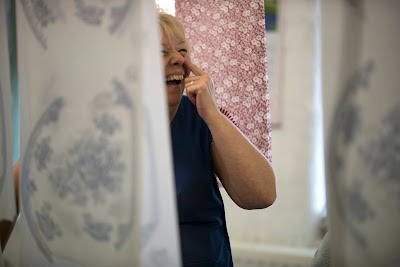'The
Transferers'
These
photographs investigate the idea of a constructed community within a workplace,
in order to deal with the tedium of working life.
In the
home of the ceramic industry - namely Stoke-on-Trent - Middleport Pottery
stands as the last remaining Victorian pottery in Britain. It is still
producing Burleigh, using some of the same traditions that were used when the
factory opened in 1888.
In June
2007 The Prince’s Regeneration Trust saved the site from closure, raising £7.5
million to renovate the site and save jobs and the traditional skills that go
with it.
In these
images I have looked at a small group of women who are concentrated in one room
at the factory and have observed how they interact with one another at a
typical day in the factory.
The
technique these women use to apply the pattern to the pottery is called tissue
transfer printing. This unique process requires enormous amounts of skill and
concentration, but like any job environment, a community is built within the
boundaries of the working limits.
This is
what I have explored within this body of work. These images invite you into
their community, and to share their stories. A genuine insight into the working
family of Middleport Pottery.
email: kelsieirvine@live.com
Joshua Cope
'Beyond the Square and Compass'
Since its early foundations, Freemasonry has become well known for being a charitable organisation and supposedly a secretive one. The United Grand Lodge of England (or UGLE) claims that Freemasonry is the oldest and largest secular organisation in the world. It is a multi-cultural, multi-racial and multi-faith establishment that has approximately 6 million members Worldwide.
Through my research, I have found that the Freemasons are not necessarily a
secretive organisation, rather an organisation with secrets and traditions. In
addition, the organisation is no longer an all-male affair despite modern
conceptions, but a male dominated fraternity with an increasing number of
all-female Lodges.
I have chosen to photograph and present this project in a social documentary
style: photographing the fraternity’s members in their natural environment in
the Lodge using a two-light set-up and ambient light. That is not to say that a
Lodge is a Freemason's 'natural environment', but that the Lodge is the a
natural meeting place associated with Freemasonry.
Possibly due to the alleged secrecy, the Freemasons are not well publicised by
the media, something I thought should change, especially as the UGLE states
that their members are keen to dispel current allegations and superstitions
surrounding the Fraternity.





No comments:
Post a Comment